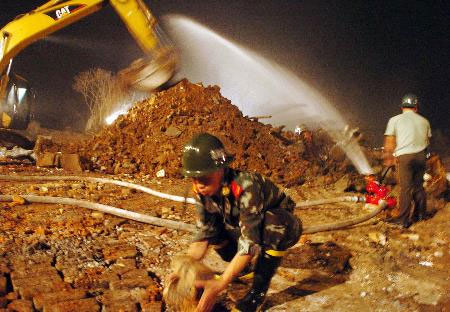An explosion at a chemical plant in Anhui Province
killed 14 people and injured 30, the government said Saturday, in the third
major industrial disaster to strike China this week.

Local
firefighters clear the site on June 17, 2006, after a Friday blast occured
in the chemical plant in east China's Anhui Province. The two-story
workshop complex has been razed to the
ground. [sina] |
The Xinhua News Agency said the death toll rose to 14 from 10 on Saturday but
did not give any details. The report cited Chen Shuo, deputy director of the
Anhui Provincial Administration of Work Safety.
Xinhua said it was still not known how many people were in the factory at the
time.
Nor was it clear what caused Friday's blast at the chemical explosives
factory owned by the Dun'an Chemical group Co., Ltd. in Anhui, said a statement
posted on the Maanshan city government Web site. Maanshan oversees Dangtu
county, where the plant is located.
Xinhua said an initial investigation showed that the blast occurred while
powder for making explosives was being emulsified.
The factory's two-story workshop was razed and that firefighters were still
working Saturday to put out the fire, Xinhua said. The site was sealed off as a
precaution against other explosions.
The Maanshan city statement quoted the provincial party head, Guo
Jinlong, said an investigation into the cause of the blast had been launched.
It was the second blast to hit China's chemical industry this week. On
Thursday, a series of explosions at the Longxing Chemical Co. plant in Zhejiang
province left one person injured and two missing.
The plant, which is close to the Oujiang river, mainly produces hydrogen
peroxide - a chemical commonly used for bleaching, antiseptics and
deodorants, Xinhua reported earlier. Industrial hydrogen peroxide contains
arsenic, heavy metals and other toxic ingredients.
Emergency workers trucked sand and rocks to the blast site to prevent
contamination of a nearby spring that feeds into Oujiang, Xinhua said.
Some 4.7 million people live along the Oujiang, which winds its way nearly
360 miles to the East China Sea.
Meanwhile, on Monday a river in north China was contaminated when a truck
overloaded with coal tar crashed and dumped its cargo into the Dasha river in
Shanxi province.
The accident forced local officials to build a series of 51 makeshift dams to
slow the river and give them time to soak up the sludge with cotton quilts,
straw and activated carbon before it could flow into a major reservoir some 45
miles downstream.
The Wangkuai Reservoir provides water for irrigation and other industrial
uses to Baoding city, which has a population of about 10 million people. It is
not the city's source for drinking water.